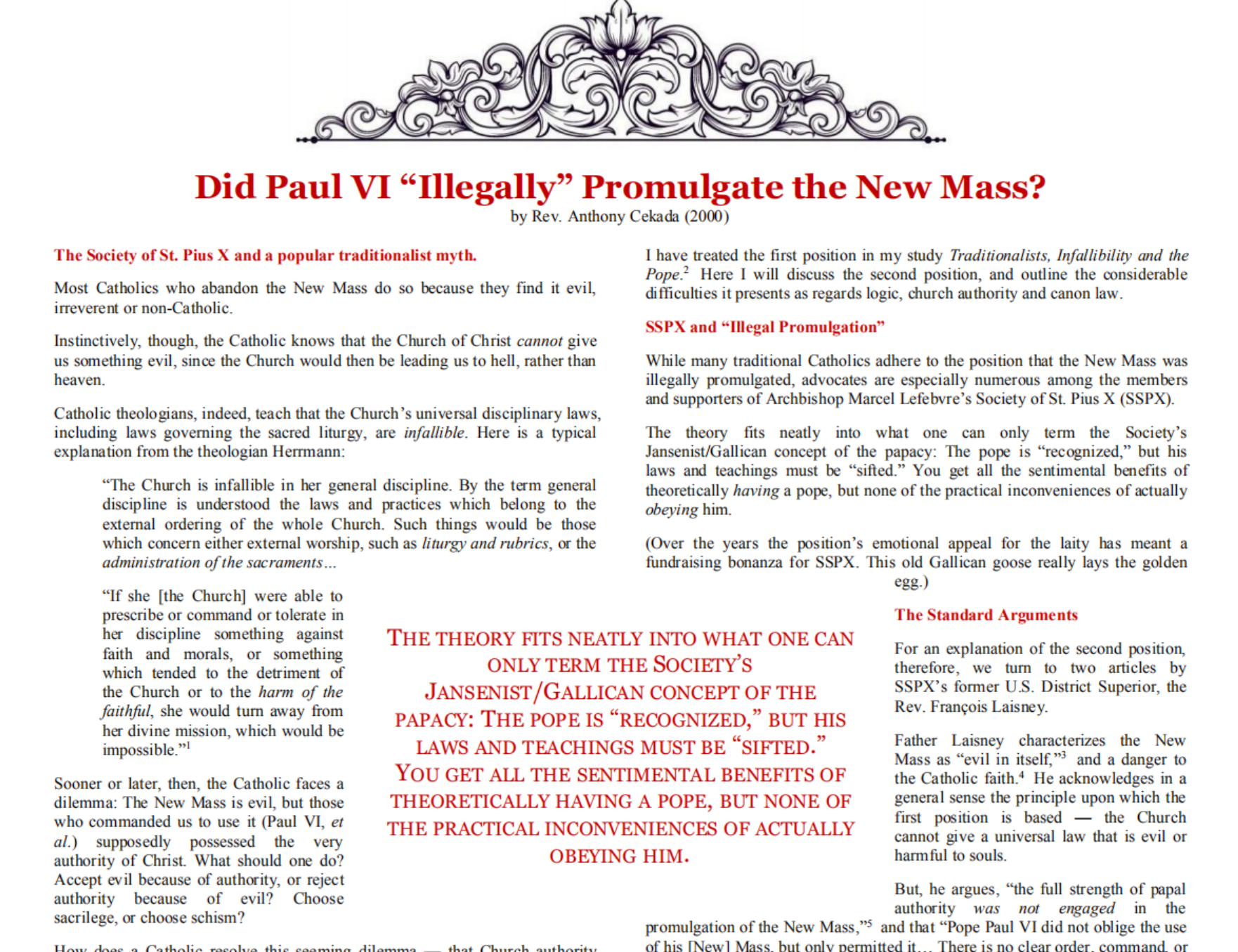Did Paul VI “Illegally” Promulgate the New Mass? by Rev. Anthony Cekada (2000)
The Society of St. Pius X and a popular traditionalist myth.
Most Catholics who abandon the New Mass do so because they find it evil, irreverent or non-Catholic.
Instinctively, though, the Catholic knows that the Church of Christ cannot give us something evil, since the Church would then be leading us to hell, rather than heaven.
Catholic theologians, indeed, teach that the Church’s universal disciplinary laws, including laws governing the sacred liturgy, are infallible. Here is a typical explanation from the theologian Herrmann:
“The Church is infallible in her general discipline. By the term general discipline is understood the laws and practices which belong to the external ordering of the whole Church. Such things would be those which concern either external worship, such as liturgy and rubrics, or the administration of the sacraments…
“If she [the Church] were able to prescribe or command or tolerate in her discipline something against faith and morals, or something which tended to the detriment of the Church or to the harm of the faithful, she would turn away from her divine mission, which would be impossible.”
Sooner or later, then, the Catholic faces a dilemma: The New Mass is evil, but those who commanded us to use it (Paul VI, et al.) supposedly possessed the very authority of Christ. What should one do? Accept evil because of authority, or reject authority because of evil? Choose sacrilege, or choose schism?
How does a Catholic resolve this seeming dilemma — that Church authority commands evil?
The Society of St. Pius X and a popular traditionalist myth.
Most Catholics who abandon the New Mass do so because they find it evil, irreverent or non-Catholic.
Instinctively, though, the Catholic knows that the Church of Christ cannot give us something evil, since the Church would then be leading us to hell, rather than heaven.
Catholic theologians, indeed, teach that the Church’s universal disciplinary laws, including laws governing the sacred liturgy, are infallible. Here is a typical explanation from the theologian Herrmann:
“The Church is infallible in her general discipline. By the term general discipline is understood the laws and practices which belong to the external ordering of the whole Church. Such things would be those which concern either external worship, such as liturgy and rubrics, or the administration of the sacraments…
“If she [the Church] were able to prescribe or command or tolerate in her discipline something against faith and morals, or something which tended to the detriment of the Church or to the harm of the faithful, she would turn away from her divine mission, which would be impossible.”
Sooner or later, then, the Catholic faces a dilemma: The New Mass is evil, but those who commanded us to use it (Paul VI, et al.) supposedly possessed the very authority of Christ. What should one do? Accept evil because of authority, or reject authority because of evil? Choose sacrilege, or choose schism?
How does a Catholic resolve this seeming dilemma — that Church authority commands evil?
The Society of St. Pius X and a popular traditionalist myth.
Most Catholics who abandon the New Mass do so because they find it evil, irreverent or non-Catholic.
Instinctively, though, the Catholic knows that the Church of Christ cannot give us something evil, since the Church would then be leading us to hell, rather than heaven.
Catholic theologians, indeed, teach that the Church’s universal disciplinary laws, including laws governing the sacred liturgy, are infallible. Here is a typical explanation from the theologian Herrmann:
“The Church is infallible in her general discipline. By the term general discipline is understood the laws and practices which belong to the external ordering of the whole Church. Such things would be those which concern either external worship, such as liturgy and rubrics, or the administration of the sacraments…
“If she [the Church] were able to prescribe or command or tolerate in her discipline something against faith and morals, or something which tended to the detriment of the Church or to the harm of the faithful, she would turn away from her divine mission, which would be impossible.”
Sooner or later, then, the Catholic faces a dilemma: The New Mass is evil, but those who commanded us to use it (Paul VI, et al.) supposedly possessed the very authority of Christ. What should one do? Accept evil because of authority, or reject authority because of evil? Choose sacrilege, or choose schism?
How does a Catholic resolve this seeming dilemma — that Church authority commands evil?

